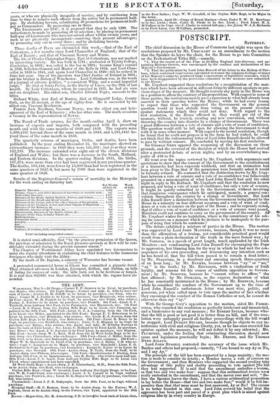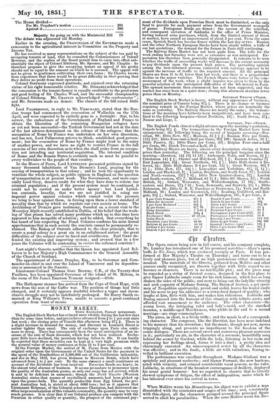POSTSCRIPT.
SATURDAY..
The chief discussion in the House of Commons last night was upon the resolutions proposed by Mr. UntinnAar as an amendment to the motion that the Speaker do leave the chair, for the House to go into Committee on the Ecclesiastical Titles Bill,—namely,
"1. That the recent act of the Pope in dividing England into dioceses, and ap pointing Bishops thereto, was encouraged by the conduct and declarations of her Majesty's Government. " 2. That the publication by Lord John Russell of his letter to the Bishop of Dur- ban', which contained expressions calculated to wound the religious feelings of many of her Majesty's subjects, produced large expectations of legislative remedies, which have been disappointed by the provisions contained in the measure now submitted- to the House."
Mr. Urquhart supported these resolutions by a recapitulation of the mat- ters which have been advanced in different forms by different speakers on pre- vious stages of the measure. He thought scarcely any party in the House was in a position to affirm the contrary of his propositions. With respect to some of those parties, the resolutions merely gave expression to what had already been.. asserted in their speeches before the House ; while he had every reason. to expect that those who supported the Government on the general question would at least abstain from voting on the present occasion against statements which they could not deny. With regard to the first resolution, if the House affirmed it, they would get rid of the measure, without, he trusted, creating any new convulsion, and without throwing the country into disorder by a change of Government. There was a great difference between a vote of censure and a vote of want of confidence.. The question would still be left open for allowing the Government to deal with it in some other manner. With regard to the second resolution, though he found that he could not propose it in the form he had wished, he could not think that the inflammatory letter of Lord John Russell should be allowed to pass by without censure. He concluded by moving his first resolution. Sir GEORGE GREY opposed the reopening of the discussion on these grounds, and the reversal of the decision at which the House had arrived after a protracted debate of seven nights, and by an overwhelming ma- jority of 438 to 95. He went over the topics reviewed by Mr. Urquhart, with arguments and quotations to show that the consent of the Government to the establishment of a hierarchy had been expressly withheld, and that an intimation had been given to the Pope that if the permission were formally asked it would be formally refused. He contended that the distinction drawn by Mr. Urqu- hart between a vote of censure and a vote of no-confidence was fallaciously grounded on a misconception of what Lord John Russell had said the other night in reply to Mr. Roebuck. Mr. Urquhart said that the resolution he now proposed, not being a vote of want of confidence, but only a vote of censure, it might be quietly submitted to by the Government, without involving that dangerous consequence which he anticipated, namely, a general eon,. vulsion throughout the country by a change of Government. But Lord John Russell drew a distinction between the Government being placed by the House in a minority on four different occasions and a vote of want of confl, deuce or a vote of censure on the part of the House ; and he expressly stated* that if either a vote of want of confidence or a vote of censure were pa Ministers could not continue to carry on the government of the country. Mr. Urquhart wishes for no legislation, where is the consistency of his ask- ing for censure on a measure which he, declares to be inadequate to the pur- pose of doing that which he condemns ? The debate exhibited a mixture of parties in the House. The motion was supported by Lord Jowl MANNERS, because, though it was no more than the affirmation of a truism, yet considerable practical good would result from a plain declaration of the truth in the most formal way ; by Mr. SADLEIR, in a speech of great length, much applauded by the Irish Members—not condemning Lord John Russell for encouraging the Pope to aggression, but blaming him for the way in which he had met the con- sequences of his own proceeding, and denouncing any intention such as he has heard of, that the bill when passed is to remain a dead letter ; by Mr. STANFORD, in a desultory and amusing speech three-quarters of an hour long; by Mr. Bers-mrs, because between " ay " or "no," " ay " is the truth ; by Mr. REYNOLDS, with a vindication of Irish loyalty, and reasons for his course of uniform opposition to Govern- ment; by Mr. SPOONER, because he "cannot refuse to affirm" the fact affirmed ; by Mr. DISRAELI, as the express declaration of what he has constantly maintained in the House ; by Mr. ROEBUCK, because while he considers the conduct of-the Government up to the time of Lord John Russell's unfortunate letter was most wise, politic, and generous, yet when called upon to vote upon the matter of fact whether they encouraged the conduct of the Roman Catholics or not, he cannot do otherwise than say " ay."
With Sir George Grey's opposition to the motion, sided Mr. FRESH- FIELD, who regarded the resolution as perfectly irrelevant and immaterial, and a hinderance to any real measure ; Sir ROBERT holds, because whe- ther the bill is good or not good it is better than no bill, and if the reso- lution were unhappily passed all further proceedings with the bill would be stopped; Lord DUDLEY STUART, because though he objects to any in- terference with civil and religious liberty, yet, as he has once recorded his opinion against the measure, he will not defeat it by any sidewind ; Mr. PLUMPTRE, under the feeling that criminating discussion should now cease and legislation practically begin ; Mr. DEEDES, and Sir Thomas DYKE ACLAND.
Lord JOHN RUSSELL contested the accuracy of the issue which Mr. Bankes and others had proposed,—namely, " I am bound to say Ay or No, and I say Ay."
The principle of the bill has been supported by a large majority ; the mo- tion is made to consider its details ; a Member moves a vote of censure on the Government ; and then Members who supported the second reading take advantage of thisiniltry and shabby proceeding to vote against :the bill they had supported. It is said that the amendment embodies a truism, as that two and two make four : suppose that this arithmetical truism were really embodied in the amendment., and that the mover rose and said, " Be- fore the Speaker leaves the chair, I have a curious arithmetical proposition to lay before the House—that two and two make four," would it be felt im- perative then that that issue must be first answered, Ay or No ? The excuse n no better founded in this ease. Lord John avowed his belief that the aggression has been part and parcel of a great plan which is aimed against religious libel ty in every country in Europe. The House divided—
For Mr. Urquhart's motion 201 Against it 280 Majority for going on with the Ministerial Bill 79 The debate was adjourned till Monday.
Earlier in the evening, the CHANCELLOR of the EXCHEQUER made a concession to the agricultural interest in Committee on the Property and Income Tax.
He has received so many representations on the subject of the tax paid by occupying tenants of land, that he consulted the Commissioners of Inland Revenue, and the replies of the Board permit him to carry into effect sub- stantially the object of Colonel Sibthorp., Mr. Spooner, and Mr. Chaplin : he therefore proposes to give the occupying tenant an appeal if his profits should not be equal to the amount on which he is assessed. The appeal will not be given to gentlemen cultivating their own farms : Sir Charles knows from experience that there would be no great difficulty in their proving that they derive no profit from their operations. Colonel SIBTROB.P expressed gratitude, and rejoiced over the returning virtue of his right honourable relative. Mr. Disitanti acknowledged that the concession to the tenant-farmer is equally creditable to the good sense and good feeling of Sir Charles Wood, and the successful championship of Colonel Sihthorp. Mr. CHAPLIN acknowledged "the condescension" ; and Mr. SPOONER made no demur. The clauses of the bill raised little fight.
Lord PALMXRSTON, in reply to Mr. URQUHART, stated that the Rus- sian troops had commenced the evacuation of Wallachia on the 17th April, and were expected to be entirely gone in a fortnight : that, to his sorrow, the endeavours of the Governments of England and France to obtain the liberation of the remaining Hungarian refugees have as yet not been successful—the Turkish Government had not at the date of the last advices determined on the release of the refugees : that the occupation of Rome by France was undertaken on her own discretion, and has not, Lord Palmerston grieves to think, established good govern- ment; but the evacuation of Rome by France might lead to the entry of another power, and we have no right to restrict France in the full exercise of her own discretion as to when she shall retire from an occupa- tion not intending any territorial acquisition. The internal condition of Rome and the Roman States is certainly such as must be painful to every wellwisher to the people of that country.
In the House of Peers, Lord LYrrELTON presented petitions signed by many thousand inhabitants of Van Diemen's Land, praying for the ceasing of transportation to that colony ; and he took the opportunity to ventilate the whole subject, as public opinion in England on the question of transportation is at present weak. The Government, and more espe- cially Lord Grey, deserve credit for what they have done to reform our criminal population ; and if the present system must be continued, it could not be carried on under better agency : but Lord Lyttel- ton contends, broadly, that we are not justified in using our imperial power against colonies which cannot resist the pressure we bring to bear against them, in forcing upon them a lower standard of morality than that by which we regulate our own society at home. The Archbishop of DUBLIN gave testimony, founded on a recent visit to the Mountjoy depot recently established in Dublin, of his belief that the work- ing of that prison has solved many problems which up to this time have appeared to him incapable of solution ; and he added, that everything he has heard of late respecting the Penal Colonies confirms his most dismal apprehensions that in such society the convicts cannot be permanently re- claimed. The Bishop of OXFORD adhered to the clear principle, that to create a penal colony is a great sin in an enlightened nation : the great difficulties of the subject must be faced and overthrown. Earl GREY de- fended the existing and improving system ; and averred that in a few years the Colonies will be contending to receive the reformed convicts !



























 Previous page
Previous page